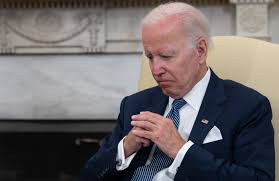Biden and McCarthy agreed to raise the US national debt ceiling
The compromise, announced Saturday night as a preliminary, includes spending cuts
Just days before the risk of declaring the government’s first-ever default, US President Joe Biden and House Speaker Kevin McCarthy reached a final agreement on Sunday to raise the government’s debt ceiling, the Associated Press reported.
The Democratic president and the House Republican majority leader spoke Sunday night as negotiators from both sides hammered out the text of the bill to give lawmakers a look at compromises that likely won’t be supported by the bottom line of both parties. . Instead, leaders are working to win support from the political center as Congress rushes to avert a federal government bankruptcy before a June 5 deadline.
“Good news! The agreement averts the worst possible crisis, a default, for the first time in our country’s history. The (House) Speaker and I have made it clear from the beginning that the only way forward is a bipartisan agreement,” Biden said Sunday night at the White House, urging both parties to work together to quickly pass the bill.
The compromise, announced Saturday night as a preliminary, includes spending cuts, but risks angering some congressmen after details of the concessions are included.
The next few days will show whether Washington will once again narrowly avoid a default on the US national debt, as has happened many times in history, or whether the world economy will enter a potential crisis.
Congressmen are expected to return to work as early as Tuesday due to the observance of Memorial Day on Monday. McCarthy promised he would abide by the rule of announcing the bill at least 72 hours before a vote. The legislative package could be introduced in time for a vote in the House of Representatives as early as Wednesday and in the Senate later in the week.
A US default would paralyze financial markets and could lead to an international financial crisis. Analysts say millions of jobs will be lost and stock markets will crash, wiping out trillions of dollars in household wealth.
McCarthy and GOP negotiators portrayed the deal as a success for the GOP, though it fell short of the drastic spending limits they had been pushing for.
On Sunday, he said at the Capitol that the deal “doesn’t give everyone everything they want,” but that’s to be expected in a divided government.
The administration gave in to some of the Republican demands, such as a work requirement for food stamp recipients who are able-bodied and without dependents. Funding for some measures to overcome the consequences of the pandemic and to hire new agents in the National Revenue Service has been canceled.
Central to the compromise is a two-year budget deal that would essentially keep spending at the same level in 2024, while increasing it for defense and veterans and capping growth to 1 percent in 2025. That, along with raising the cap of the debt for two years, postpones the sensitive political issue until after the next presidential election.



